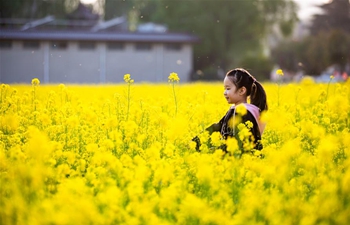YINCHUAN, April 8 (Xinhua) -- At the break of dawn, as the sun rises above the Helan Mountains in northwest China, hordes of grazing sheep roam freely.
They are the Helan Mountains blue sheep. As most female sheep are in the middle of pregnancy, male and baby sheep are more commonly seen these days.
The blue sheep are wild animals under Class Two national protection. As they are good at climbing cliffs, with their skills dubbing them "cliff fairies" in China. The species usually reside in areas with bare rocks about 2,100 meters to 6,300 meters above sea level in northwest and southwest China.
The sheep thrive in large groups in the Helan Mountains, located at the intersections of the Mongolian Plateau, the Loess Plateau and the Qinghai-Tibet Plateau. The mountains are one of the areas with the highest concentration of blue sheep in the world.
Official figures show that about 44,000 blue sheep live in the Helan Mountains. In the densest areas, there are 20 blue sheep per square km on average.
The number of blue sheep has been rising as the environment in the area improves over the years.
According to local official Wang Jifei, when a national nature reserve was established in the mountains in 1983, vegetation was poor, and domestic sheep fought for food with the wild blue sheep.
"Poaching also posed big problems," he said. "There were fewer than 1,800 blue sheep at that time."
Beginning in 2001, the reserve began to see local herdsmen relocate with their domestic sheep, giving space for the wild animals to thrive.
Currently, the rate of vegetation on the Helan Mountains has risen to 65 percent, and the blue sheep number is rising at an average rate of 10 percent. Old coal mines were also closed on the mountains in the past several years.
"As the environment and people's environmental protection awareness improve, the blue sheep are no longer scared of tourists," said photographer Wang Dexing. "The animals get so close to people that some can even touch their horns."
















